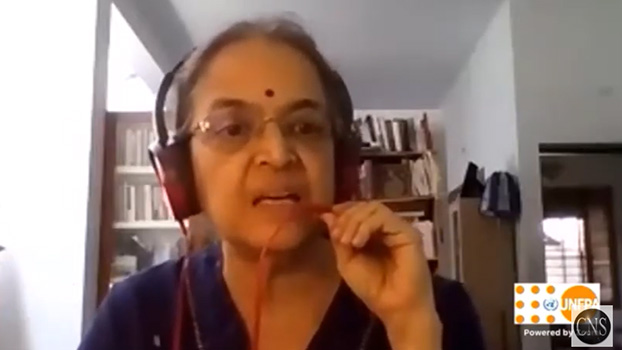Ensure ‘universal basic income’ for migrant workers: Gita Sen

Gita Sen, an international scholar, says that the pandemic has shown the fragility of the economic systems, which has impacted informal workers, migrant workers, women, and minority communities, the most.
“We need to move towards universal basic income for everyone, including the migrant workers on whom our economies depend,” she said, speaking at an international conference.
She lamented that despite their contributions for development, countries are unwilling to recognise the migrant workers and give them citizenship rights.
Gita Sen is an adjunct professor of Global Health and Population at the Harvard University and distinguished professor at Public Health Foundation of India.
She has worked for 35 years nationally and internationally on population policies, reproductive and sexual health, gender equality and women’s human rights, as well as issues of poverty, human development and labour markets.
She was speaking at the second session of the 10thAsia Pacific Conference on Reproductive and Sexual Health and Rights (APCRSHR10) held virtually recently.
Migrant workers are suffering due to pandemic lockdown as they lost their jobs in many countries. Bangladesh is also feeling the pinch of the crisis as remittance is one of the mainstays of the country’s economy.
Foreign Minister Dr AK Abdul Momen wrote letters to his counterparts in many countries particularly in the biggest markets of the Middle-East, asking them to help Bangladeshi workers. Many workers have already returned.
The World Bank predicted that Bangladesh will lose more than 20 percent of its earnings from remittance.
Prime Minister Sheikh Hasina recently called upon the countries to retain the jobs of migrant workers during this time of pandemic.
She also made three-point proposals at an ILO meet to purge of the crisis. Firstly Jobs of migrant workers at the overseas markets must be retained during this crisis. Secondly In case of lay-off, compensation and other dismissal benefits must be paid in full along with ensuring their safety and health benefits; and thirdly after the pandemic, these workers would have to be recruited for reactivating the economy.
The foreign ministry also launched an international Covid19 management and recovery fund so that migrant workers can stay in the host countries during this crisis period.
Gita Sen, speaking on the Accelerating Rights and Choices for all in a Post-COVID Asia-Pacific, said “We are living in deeply unsettling times. The pandemic has turned everything upside down, how we live, how we work, how we interact.”
She gave Singapore as an example while highlighting the fragility of the economic systems during the pandemic.
“While it (Singapore) could manage the pandemic well in the initial stages, but later on the migrant workers, who lived in crowded buildings on the outskirts of Singapore and lacked access to proper services, became the hub for the new spiking,” she said.
It’s because, she said, they did not have adequate space during lockdown and services were inadequate.
“We need to invest in housing, water and sanitation. We need progressive tax systems. We have lots of millionaires and billionaires in this region. The rich must pay a wealth tax to fund essential public services,” she said.
She also pointed out the existing “deeply structural” inequalities that exacerbated during the pandemic.
“We saw emergence of another parallel pandemic of violence against women and girls—those who were locked up with their abusers in their homes during lockdown,” she said.
Gita Sen also highlighted the weakness of the health systems where women workers tend to be at the bottom of the health worker hierarchy, and said to handle any epidemic, “you need to continuously invest in health systems”.
At the same time, she emphasised on education for girls and women and ensuring that their key requirements including access to safe abortion, availability of contraception and comprehensive sexuality education for young people are part of essential packages of care.
She also spoke on the “unreliability and very high cost” of private health care and said “We cannot depend on the private sector in healthcare (and in education) if we want to move towards universal health coverage”.
“Investment in public provision of health care services, effective regulation of the private sector and ensuring that the women health workers, who predominate at the lower rungs, are treated properly as workers.
“We need sustainable agriculture, water and energy that supports livelihoods. Women are key in moving towards a more balanced economy and more sustainable and caring societies,” she said.
The UNFPA Asia-Pacific, in partnership with UNFPA Cambodia, the APCRSHR10 secretariat in Cambodia Reproductive Health Association of Cambodia (RHAC) and the CNS co-hosted the session featured globally and regionally renowned advocates championing the ICPD Programme of Action and UNFPA's crucial mandate at this time of global challenge.
The International Conference on Population and Development (ICPD) in Cairo in 1994 has guided the work of the UN population agency, UNFPA, and put individual rights and choices, with a focus on sexual and reproductive health and gender equality, at the heart of sustainable development.


